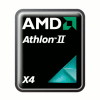- Qualcomm Launches Snapdragon 4 Gen 2 Mobile Platform
- AMD Launches Ryzen PRO 7000 Series Mobile & Desktop Platform
- Intel Launches Sleek Single-Slot Arc Pro A60 Workstation Graphics Card
- NVIDIA Announces Latest Ada Lovelace Additions: GeForce RTX 4060 Ti & RTX 4060
- Maxon Redshift With AMD Radeon GPU Rendering Support Now Available
AMD Athlon II X4 620 – Quad-Core at $99

Last month, AMD became the first company to bring a $99 quad-core processor to market, the Athlon II X4 620. The question, of course, is whether or not it delivers. At 2.60GHz, it looks to offer ample performance, but the lack of an L3 cache is sure to be seen in some of our tests. Luckily, the chip’s overclocking-ability helps negate that issue.
Page 7 – System: Sandra Memory, Multi-Core Efficiency
Generally speaking, the faster the processor, the higher the system-wide bandwidth and the lower the latency. As is always the case, faster is better when it comes to processors, as we’ll see below. But with Core i7, the game changes up a bit.
Whereas previous memory controllers utilized a dual-channel operation, Intel threw that out the window to introduce triple-channel, which we talked a lot about at August’s IDF. Further, since Intel integrates the IMC onto the die of the new CPUs, benefits are going to be seen all-around.
Before jumping into the results, we already had an idea of what to expect, and just as we did, the results seen are nothing short of staggering.


Not only does raw freqency effect memory bandwidth, so does a robust cache, it seems. The X4 620 fell quite behind the Phenom II chips here, in both bandwidth and latency.
Sandra 2009 Multi-Core Efficiency
How fast can one core swap data with another? It might not seem that important, but it definitely is if you are dealing with a true multi-threaded application. The faster data can be swapped around, the faster it’s going to be finished, so overall, inter-core speeds are important in every regard.
Even without looking at the data, we know that Core i7 is going to excel here, for a few different reasons. The main is the fact that this is Intel’s first native Quad-Core. Rather than have two Dual-Core dies placed beside each other, i7 was built to place four cores together, so that in itself improves things. Past that, the ultra-fast QPI bus likely also has something to do with speed increases.

With the previous memory result, this one isn’t too surprising. The X4 620 is the first recently-reviewed chip to fall under 3.0GB/s multi-core bandwidth. Oddly enough, its latency between cores is matched with the faster X3 720.
Support our efforts! With ad revenue at an all-time low for written websites, we're relying more than ever on reader support to help us continue putting so much effort into this type of content. You can support us by becoming a Patron, or by using our Amazon shopping affiliate links listed through our articles. Thanks for your support!





